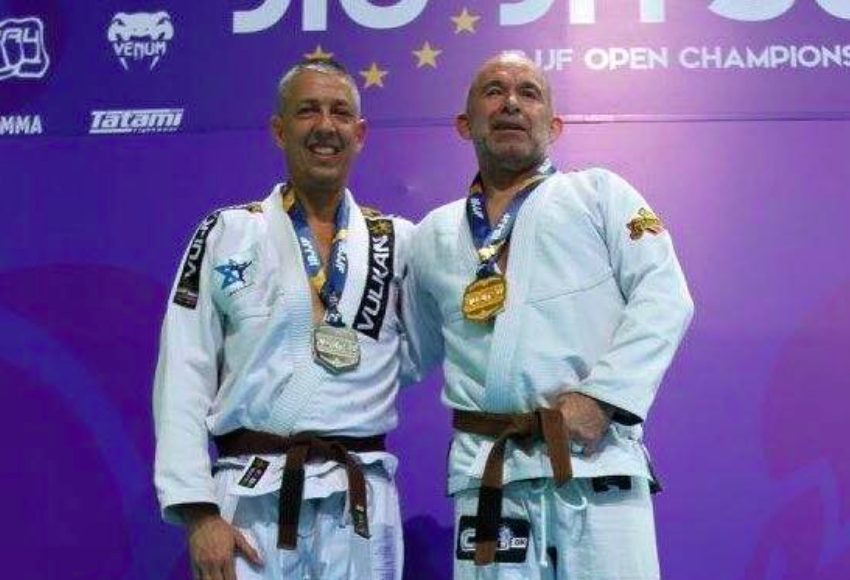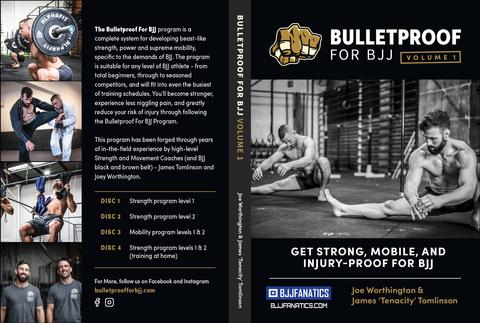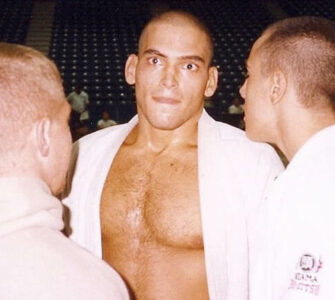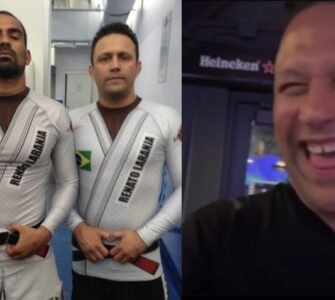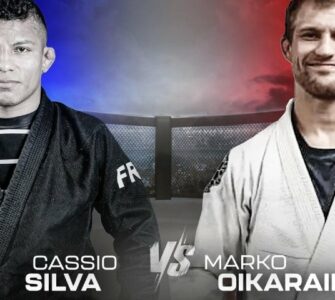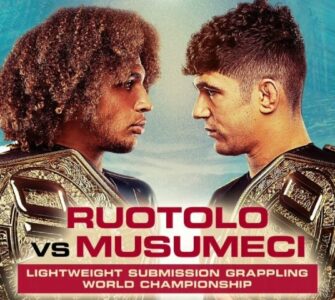Lars Roskær from Denmark is 58 years old and he just won his 5th gold medal at the European Championships in Portugal, this year as brown belt just a few months after being promoted.
Since he took up Jiu Jitsu at age 52, he has been competing extensively, taking 19 medals at competitions like NAGA Paris, Danish Championships, Swedish Open and Scandiavian Open, often taking on much younger opponents due to a lack of competitors in his age group.
BJJ Globetrotters asked the /r/BJJ community on Reddit to shoot Lars some questions and he was happy to answer them over a Friday morning brunch on a cold winter day in Copenhagen.
***
Is old man strength a real thing?
I think it depends on what you have been doing and varies from person to person. For me it comes from doing sports all my life. Youth wrestler, Judo and such. And my work as a carpenter, where I use my hands a lot.
How many matches did you have in order to win the Europeans?
This year I had one match in Master 5. There were no opponents in Master 6, so I moved down one age group. In the absolute, I had a total of three matches, winning two of them. The other years at the Europeans I’ve usually had between to and four matches to win the gold, but sometimes only one. I always compete in the absolute division too, unless I’m injured.
What kind of training did you do before you took up Jiu Jitsu?
I started wrestling in the mid 60s when I was 8-9 years old and did that until I was 15 when I broke part of a bone in my leg and had to have it in a cast. After that I never really got started again, especially since other things became more and more interesting, girls for instance. I then started Judo in the mid 70s and continued doing it when I moved to France to work for seven years in Paris, Cannes and Nice as a chef and waiter. I also played a lot of football and rugby. In 1979, I got my Judo black belt there and trained until the mid 90s when I started to lose interest in it, picking it up a few times since but never really getting back into it. There started to be fewer people in the classes and fewer people going to competitions, so I was ended up just running and such in that period until I found BJJ.
Are you taking any supplements?
No, not really. Just a vitamin pill and a Tuborg now and then. I think a lot of my strength and physique also comes from my upbringing, where my mother – who was a nurse – would feed me with lots of solid food. I always had fish oil, liver, heart, whole weat and such, so I don’t think I ever needed anything.
How much do you train?
I train Jiu Jitsu no more than three days a week, as it is too hard on my body to use the same muscle groups more often than that. But I do at Jiu Jitsu at least twice a week and then supplement with running and a bit of weight lifting on the other days. So in total I’m doing at least four days a week. Running is helping me a lot with my endurance and cardio.
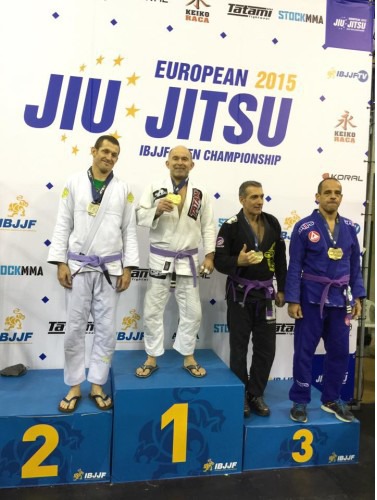
Lars with a gold medal as a purple belt last year
How hard do you roll?
It depends on the day. I never go 100% in training, I think that comes from experience. When I am training for a competition, I like to feel relaxed in that period and then focus on peaking when I am supposed to do it. One of the main criterias for my success in competition is whether or not I get injured in the preparations, so I am very aware of that in my training. I’ve made the mistake a few times to go too hard in the final period leading up to a competition and getting injured there, sidelining me for the rest of the preparations and affecting my shape a lot. When competing, I also try to not go too hard in the first match to avoid injury.
Any good advise for those who started Jiu Jitsu late in life?
You have to enjoy the training and accept that it takes time. Especially if you come from other sports, since you have to get rid of a lot of movements that are natural. When I started BJJ, I constantly went to my knees or stomach like in Judo and it took a long time to get rid of that. I still do it, but it is getting better. I think my best advise is to take it nice and easy and don’t be afraid to lose a lot.
Takedowns or guard pull?
Haha
How difficult is it find opponents and how much are you willing to adjust in terms of age and weight category?
I’ll move to where ever I can find opponents. I’ve competed in everything from Adult to Master 6 and have no problem going up against the young guys too. It’s all experience.
Do you do anything specific to prevent injuries?
I listen to my body and is of course aware of my age. I think the key is to know what I can and can not do.
What kind of injuries did you have?
My elbow was dislocated a few years ago during training, I’ve broken a toe and had small meniscus- and disc injuries, but apart from that, nothing crazy really. Oh yes, I once partially broke my chin when the new “Russian cross” moves were introduced in Wrestling in Denmark many years ago. It was the week before the Copenhagen Championships, so I missed that.
Did you ever win anything before Jiu Jitsu?
I was second at the Danish Championships and also a big competition in Sweden with 32 people in my division. I got a trophy for the fastest win, under 30 seconds. In Judo I won a few local championships and I was at a trial for the national team in Rugby.
What made you start Jiu Jitsu that late in life?
My son and his friend started Jiu Jitsu and it inspired me to pick up Judo again, so I went to the club next door, but there wasn’t really anyone training. So I went back to sit down and watch my son train and thought that maybe I should try it so I could do something together with him. So that’s how I got started. A year later, my son stopped due to typical teenager reasons but I’m still there.
Do you have any advise for how to handle nerves before a competition?
Compete as much as possible. Sign up for everything you can. It helps a lot to be comfortable with the whole feeling of being at a competition, the sounds, the routines and such. You will never get rid of the nerves, but you can learn to control them and turn them into something positive. I still have butterflies in my stomach and weak knees when I am competing, but as soon as the match starts, it’s all gone. So my advise is to just compete.
I watch folks like Keenan Cornelius, Jeff Glover, Eddy Bravo, invitational competitions and think I’ll never be worthy of a black belt! Does you feel this way and if so, how does you cope with that feeling?
I don’t really think about it. These guys are 30 years younger than me, competes all the time and trains with the best guys 7 days a week, so I don’t think I can even start to compare myself with that. I’m fully satisfied and confident with my brown belt when I’m comparing with my peers.
What was your mindset and goals like when you started as a white belt and has it changed as you were promoted and started winning competitions?
When I started and was a white belt, I didn’t really have any thoughts about what I should accomplish. It was just for general fitness and for having something to do with my son. But it was a natural thing for me to start signing up for competitions, as I have always done with all the other sports I’ve done, and I don’t like to lose after all. And I think that if you want to accomplish anything, you have to compete. Otherwise you don’t know where you are, what you can and what mistakes you are making.
How was your physical shape when you started and how did your athletic background help you?
Having done sports all my life of course helped me a lot to come back to training. But my general shape when I started was not very good, as I had just been traveling around the world doing nothing but eating and drinking and weighed 94 kg. Now I’m down to around 78.
What else do you do in your life?
I work as a carpenter and enjoy concerts and traveling. Last year I walked the “Camino” – an 800 kilometer walking route from France over the Pyrenee moutains and down the Spanish coast. I also traveled around the United States for three weeks the same year. I’ve always enjoyed traveling and worked as a chef several places, including New York and France as we already talked about.
Do you think training just twice a week is enough to achieve anything?
There is only one way to find out and that is by competing. Then you know if it is enough or maybe you should do more. During my preparations for this years Europeans, I skipped some of the advance classes in order to recover more, but I think it affected my last match in the absolyte division, where I was really tired. It is always a balance for me between being in shape and not being injured.
Did Jiu Jitsu change your life habits?
I’m not sure, but it has definitely brought some positive things into my life. First of all, it’s always a pleasure to go to training. And I’m really glad that I’ve gotten so many international friends all over the world.
Stop Feeling Sore, Tired, And Injured And Start Being Preventative With Your Injuries. It’s Time To Become Bulletproof For BJJ!
- Get grappling-specific exercise routines to build mobility, strength, grip, and core, with or without a gym
- This system was designed by BJJ brown and black belts and professional fitness gurus Joe Worthington and James Tomlinson
- Get different exercises, sets, reps, and more to keep your workouts fresh and dynamic:

